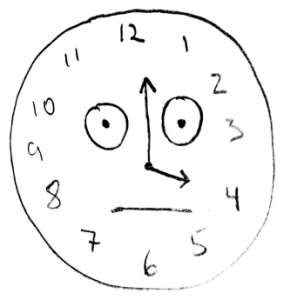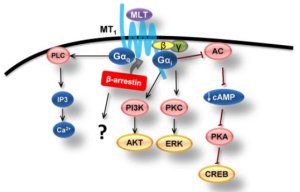
Artstract by Erik Lucken
Introduction
Sleep is such a fundamental part of our lives that it can be easy to overlook all of the benefits of getting a good night of rest. In addition to feeling well-rested and recovered for the next day, sleep allows our body to heal by boosting our immune system, increasing focus and productivity, improving memory consolidation, and many other effects (1). It is clear that these are all great benefits and making sure that we get enough sleep should be a top priority in our lives, but this can be much easier said than done.
What is Insomnia?
The key to getting a good night of sleep is by having a healthy circadian rhythm, also known as a sleep cycle. In dark conditions, our body begins a chain of chemical reactions that produce melatonin which binds to the melatonin receptor and helps our body relax by reducing nerve activity, which can make it easier to fall asleep (2). When your brain doesn’t produce enough melatonin, not enough can bind to its receptors so your body has a more difficult time knowing when to fall asleep, which also can distort your circadian rhythm which can take days or even longer to repair. It is normal to experience short-term insomnia (up to 3 weeks) at some point in our life, typically a response to stress, but it can also be a side effect of anxiety disorders, trauma, or certain medications.

Figure 1: The Melatonin Receptor
The Neurochemistry of Insomnia
Making sure that enough melatonin is being produced is the main step in fostering a healthy sleep cycle. While still being investigated, calcium is found to regulate the synthesis of melatonin from the amino acid tryptophan. It has been found that the enzymes responsible for these reactions are only affected by lower calcium levels, so they are unable to produce melatonin when calcium levels are too low. The cause of low calcium in terms of sleep is still under investigation. Figure 1 shows the signaling pathway of melatonin. When melatonin binds to the MLT GPCR, it causes Gi to dissociate from the receptor which causes adenylyl cyclase to be inhibited, which prevents cAMP from being produced and this prevents the activation of PKA and CREB downstream. These are all necessary steps to begin falling asleep. When melatonin levels are reduced, this pathway is not activated as much as it should be so cAMP and CREB levels increase when they are not supposed to (2).
In addition to melatonin, GABA and norepinephrine have been receiving some attention in sleep research. The underlying mechanisms are unknown but it has been consistently shown that in people with insomnia, GABA and norepinephrine levels are decreased, which makes it more difficult to sleep since these substances prevent hyperarousal and hyperexcitation.
Conclusion
We face different stressors every day and sometimes it can be difficult to fall asleep. Insomnia is a very real thing that can be a result of any number of factors, ultimately leading to a decrease in calcium that is able to be used by enzymes producing melatonin.
Sources